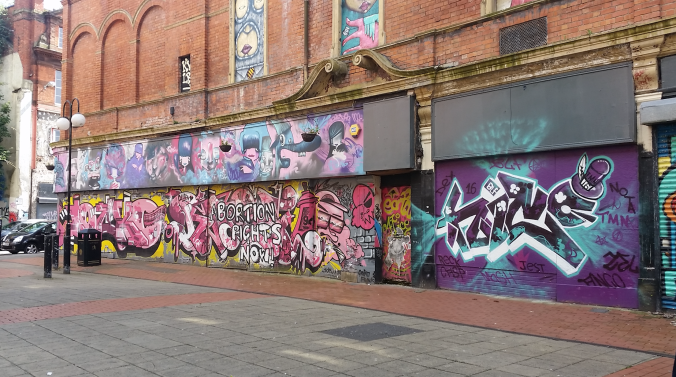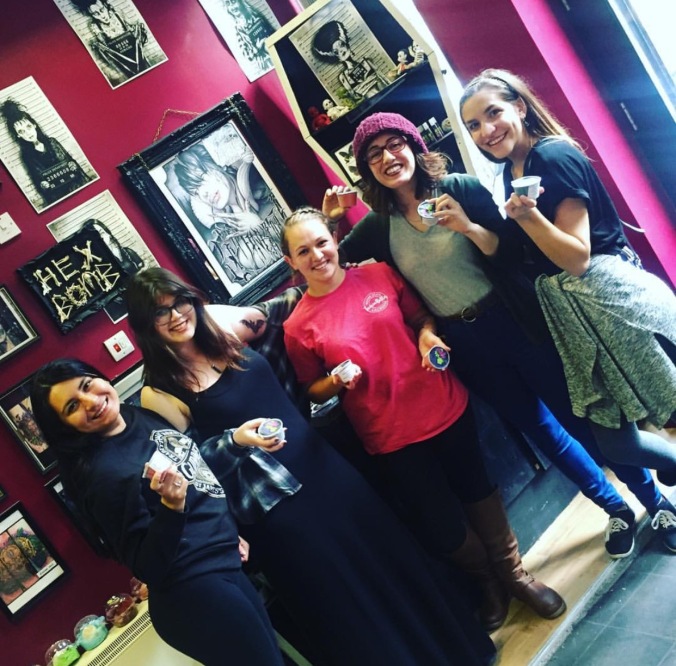Let me start by saying that Belfast is one of my favorite cities. Belfast is gorgeous. Belfast is bae.
Many of us made our first trip to the NI capital this past Friday; Sam and Jen, true journalists that they are, went last weekend so they could gather material on the July 12th holiday there. If you’re an American whos been keeping up with the blog, you may that July 12th is a date celebrated by Unionists, and commemorates the victory of William of Orange at the Battle of the Boyne. The holiday consists of massive bonfires the night before and a parade of Orangemen the day of. These events have, during NI’s Troubles, been an axis mundi of sectarian violence, but I’ve heard that this year’s was one of the most peaceful in recent memory. However, our bus route into the city drove us past a Unionist estate (its bonfire remains charred in a concrete courtyard) and we were welcomed with some very strong anti-Catholic graffiti, which I will not quote here.

(Some street art about another contentious issue)
I’ve seen a lot of comparably menacing graffiti, from both sides, even in Armagh which we find so quiet and tranquil. If you go to the Belfast’s interface neighborhoods, those that border Catholic and Protestant communities, you will find countless murals remembering each side’s heroes. On the Falls Road is a portrait of Bobby Sands, a hunger striker whose death by starvation was a rallying cry for Republican Nationalists. On the Shankill Road, a Unionist community, you could find Belfast’s Mona Lisa, which depicts a masked gunman pointing a rifle at the viewer; the barrel of the gun seemed to follow you no matter what angle you viewed it (this mural was demolished last year). But besides the murals, Belfast is absolutely covered in street art. Almost every alley wall is tagged and spray-painted, the sides of buildings totally covered with non-political art. The culture of public art here is strong, and I think its because there’s an anonymity of it, even when you tag. There is an ability to appear, leave a mark, make a statement, and disappear. I find that the people here are reluctant to discuss the past few decades because you never know who might be listening. The murals, the graffiti, and public art are a way to express loudly what they maybe can’t say with words.

(Belfast City Hall)
From the bus station, we walked to the MAC, an arts centre in Belfast’s cathedral quarter. We had lunch with playwright Martin Lynch there, who gave us a workshop on character development. He related his experience growing up in Belfast, and coming into adulthood just as the Troubles began. He says that in his neighborhood, a densely populated Catholic community, was rife with exceptional storytellers. He learned there that good stories are often around you, and they’re always in your own family. He lamented that many of these people, including his docker father, had the souls of poets and thinkers, but were trapped making a living through hard labor. It still makes him angry that opportunities for creative development skip over poorer communities.

(Apologies for the poor camera angle, but I swear that’s Martin in the back)
After lunch, we ventured from the city center to the Queens quarter, where Queens University is. Ellie and I joined Kimberley and Terri at the Lyric Theatre to see Frank McGuiness’s play Observe the Sons of Ulster Marching to the Somme. We met up there with Nathaniel, who will come to Armagh this week as a guest teacher. The play is a powerful story about eight Ulster natives who have volunteered their services during WWI and are sent to the Somme; this year is the centennial of this bloody battle. Nathaniel’s review (“I’m emotionally fucked”) pretty much encapsulates my reaction to this production. The set– its backdrop of endless bleak sky– was beautiful, the roles were brilliantly acted, and the script explored everything from loyalism, fraternity, sexuality, spirituality, and hopelessness. Every man in the regiment has a breaking point when he knows that he is going to die. Piper, whose memories as an old man create the frame for the story, began the play the most nihilistic of them all; at the end, he is the one doing the battle cry and encouraging the other men in the regiment to fight. He is the only survivor.
All the characters are deeply loyal to the English crown; they are all Protestant and share stories about doing their part to suppress the Rising, which is happening contemporary to the Great War. Anti-Catholic slurs are common in the script, and I wondered how audience members reacted to the representation of loyalism in the play. But beyond each character’s allegiances and prejudices are universal themes– war, belonging, mortality. I personally never thought I, being from a largely Irish-American Catholic family, would have been empathetic to them, and it was a reminder that I have brought my own prejudices with me. I’m not from here. My context is different. There’s a moment at the very end, as they’re just about to march into combat, that each of them dons an orange sash, a symbol of Ulster loyalism. But then, they each exchange their sashes with each other, a gesture of their unity. It was incredibly moving. So it was a good day, to learn about play writing from someone from one background, and then seeing a play about people from the other side. That Friday had a beautiful symmetry for me.

(The River Lagan, which we walked along to get to alcohol.)
I’m sorry I write an entire book every time I do a blog post. I have a lot of feelings.
(Maggie May’s)The next day we had breakfast at Maggie May’s and then made our way back to the city center, where some of us were getting tattooed at Addinktion Belfast, also the headquarters of Hex Bombs bath bombs. Because so many of us had a session, we were camped out there for hours. For a while I was afraid that we must have been annoying to the staff, taking over their waiting area. But as each person finished their session, with talented artist James Conway, our rapport with the staff grew stronger. We joked about American presidential candidates, tried to imitate each others’ accents, and bonded over our favorite TV shows. Instead of a day full of sight-seeing (there’ll be plenty of time for that next weekend!) we spent that time making great friends.

(from Hex Bombs Instagram)
I’m sorry, I’m really done now.





